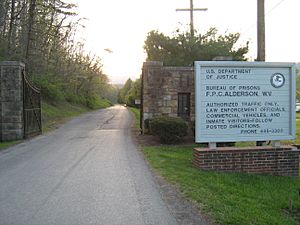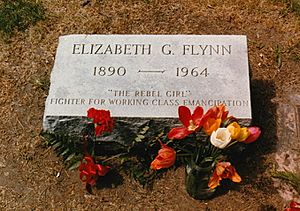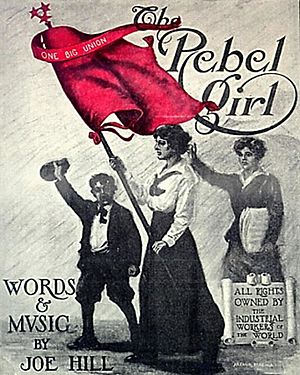Elizabeth Gurley Flynn facts for kids
Quick facts for kids
Elizabeth Gurley Flynn
|
|
|---|---|
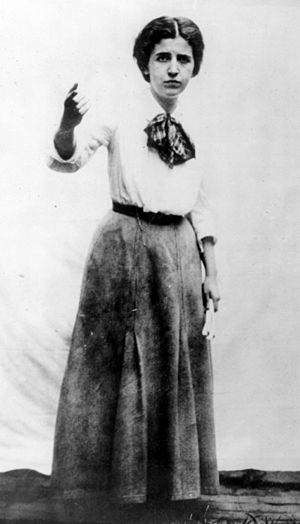 |
|
| Chairperson of the National Committee of the Communist Party USA | |
| In office January 31, 1961 – September 5, 1964 |
|
| Preceded by | Eugene Dennis |
| Succeeded by | Henry Winston |
| Personal details | |
| Born | August 7, 1890 Concord, New Hampshire, U.S. |
| Died | September 5, 1964 (aged 74) Moscow, Russian SFSR, Soviet Union |
| Resting place | Waldheim Cemetery, Chicago |
| Nationality | American |
| Political party | Communist |
| Occupation | Labor leader, activist |
Elizabeth Gurley Flynn (born August 7, 1890 – died September 5, 1964) was an American leader who fought for workers' rights. She was also an activist and a strong supporter of women's rights. She played a big part in the Industrial Workers of the World (IWW), a group that helped workers.
Flynn was one of the people who started the American Civil Liberties Union (ACLU), which works to protect everyone's rights. She was a clear voice for women's rights and for women to have the right to vote. In 1936, she joined the Communist Party USA, a political group with ideas about how society should be run. Later in her life, in 1961, she became the leader of this party. She passed away while visiting the Soviet Union, where she was honored with a large public funeral attended by many people in Red Square.
Contents
Early Life and Influences
Elizabeth Gurley Flynn was born on August 7, 1890, in Concord, New Hampshire. Her parents were Annie and Thomas Flynn. In 1900, her family moved to New York, where she went to public schools.
Her parents taught her about socialism, which is a way of thinking about how society and the economy should be organized, often focusing on fairness for all. When she was only fifteen, she gave her first public speech. It was called "What Socialism Will Do for Women" and she gave it at the Harlem Socialist Club. After this, she felt she had to speak up for social change. She decided to leave high school early, which she later said she regretted. However, some say she was asked to leave school because of her political activities.
Her Work for Workers' Rights
Joining the IWW (Wobblies)
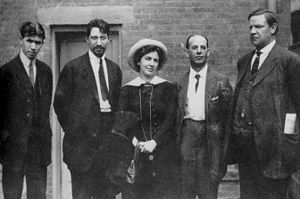
In 1907, Elizabeth Gurley Flynn became a full-time organizer for the Industrial Workers of the World (IWW). This group, also known as the "Wobblies," worked to improve conditions for workers. She attended her first IWW meeting in September of that year.
Over the next few years, she helped organize workers in many places. She worked with clothing makers in Pennsylvania and silk weavers in New Jersey. She also helped restaurant workers in New York, miners in Minnesota, Missoula, Montana, and Spokane, Washington, and textile workers in Massachusetts. During this time, a writer named Theodore Dreiser called her "an East Side Joan of Arc," comparing her to a famous French hero.
In 1909, Flynn took part in a "free speech fight" in Spokane. This was a protest to demand the right to speak freely in public. To delay her arrest, she chained herself to a lamp-post. She was arrested ten times during this period but was never found guilty of any crimes.
Protecting Civil Liberties
Flynn was one of the people who helped create the American Civil Liberties Union (ACLU) in 1920. The ACLU is a group that works to protect the rights and freedoms of all Americans. She played a big role in the effort to help Sacco and Vanzetti, two men who were found guilty of a crime and many people believed were innocent.
Flynn cared a lot about women's rights. She strongly supported women's suffrage, which was the movement for women to gain the right to vote. She also pointed out that many trade unions, which are groups that represent workers, were mostly led by men and didn't always understand what women workers needed.
From 1926 to 1936, Flynn lived in Portland, Oregon, with Marie Equi, who was also a supporter of women's right to vote and a "Wobbly." Even though Flynn was often not well during this time, she actively supported the 1934 West Coast Longshore Strike, a big strike by dockworkers. In 1939, Flynn was re-elected to the ACLU board. However, in 1940, the ACLU decided to remove all members of the Communist Party from its board, and Flynn was included in this decision.
Leading the International Labor Defense
From 1927 to 1930, Flynn was the head of the International Labor Defense. This group worked to defend workers who had been put in jail. During her time as chair, she worked hard to try and free jailed labor organizers Thomas J. Mooney and Warren K. Billings.
Work with the Communist Party
In 1936, Flynn joined the Communist Party. She wrote a column about women's issues for the party's newspaper, the Daily Worker. Two years later, she was chosen to be on the party's national committee. As mentioned before, her membership in this party led to her removal from the ACLU board in 1940.
During World War II, she was very important in fighting for equal pay and opportunities for women in jobs. She also pushed for more day care centers for mothers who worked. In 1942, she ran for Congress in New York and received 50,000 votes.
In 1951, Flynn was arrested along with sixteen other Communist Party members. They were accused of planning to "teach and advocate violent overthrow" of the government. After a nine-month trial, she was found guilty. She spent two years in Federal Prison Camp, Alderson in Alderson, West Virginia. Later, she wrote a book about her time in prison called The Alderson Story: My Life as a Political Prisoner.
After she was released from prison, Flynn continued her work for leftist and Communist causes. In 1957, she ran for the New York City Council as a Communist and received 710 votes. In 1961, Elizabeth Gurley Flynn became the first national chairwoman of the Communist Party of the United States.
Later Life and Legacy
In 1907, Flynn married J. A. Jones, an organizer for the Industrial Workers of the World. She wrote in her autobiography, "I fell in love with him and we were married in January 1908." They had two sons. One son, John Vincent, died shortly after birth. Their second son, Fred Flynn, was born in 1910 and passed away in 1940.
Elizabeth Gurley Flynn died in the Soviet Union on September 5, 1964, when she was 74 years old. The Soviet government held a state funeral for her in Red Square, with over 25,000 people attending. As she wished, her body was flown back to the United States. She was buried in Chicago's Waldheim Cemetery. Her grave is near those of other important figures like Eugene Dennis, Bill Haywood, Emma Goldman, and the Haymarket Riot Martyrs.
Flynn left her personal belongings, like books, clothes, and furniture, to Dorothy Day's Catholic Worker house in New York City. Flynn and Day had met in the 1910s, and Flynn often sent old clothes and blankets to the Catholic Worker house.
Flynn's work as an activist had a wide impact. Her actions were remembered in a popular song. A famous song called "The Rebel Girl" was written by labor activist and musician Joe Hill to honor her.
A speech Flynn gave at her trial in 1952 is listed as one of the top 100 speeches of the 20th Century by American Rhetoric.
In Popular Culture
A made-up version of Elizabeth Gurley Flynn appears in John Updike's novel In the Beauty of the Lilies. She is also shown in Jess Walter's novel The Cold Millions.
A New Hampshire historical marker is planned to be put up in her hometown of Concord to honor her.
Famous Quotes
- "History has a long-range perspective. It ultimately passes stern judgment on tyrants and vindicates those who fought, suffered, were imprisoned, and died for human freedom, against political oppression and economic slavery."
- "We believe that the class struggle existing in society is expressed in the economic power of the master on the one side and the growing economic power of the workers on the other side meeting in open battle now and again, but meeting in continual daily conflict over which shall have the larger share of labor's product and the ultimate ownership of the means of life."
- "I fell in love with my country—its rivers, prairies, forests, mountains, cities and people. . . . It could be a paradise on earth if it belonged to the people, not to a small owning class." – From Jess Walters' The Cold Millions
Writings by Elizabeth Gurley Flynn
Books and Pamphlets
- Debs, Haywood, Ruthenberg, New York: Workers Library Publishers, 1939.
- I Didn't Raise My Boy to Be a Soldier — for Wall Street. New York: Workers Library Publishers, 1940.
- Earl Browder: The Man from Kansas. New York: Workers Library Publishers, 1941.
- Questions and Answers on the Browder Case. New York: Citizens' Committee to Free Earl Browder, 1941.
- Coal Miners and the War. New York: Workers Library Publishers, 1942.
- Women in the War. New York: Workers Library Publishers, 1942.
- Daughters of America: Ella Reeve Bloor, Anita Whitney. New York: Workers Library Publishers, 1942.
- Women Have a Date with Destiny. New York: Workers Library Publishers, 1944.
- Woman's Place in the Fight for a Better World. New York, New Century Publishers, 1947.
- The Twelve and You: What Happens to Democracy is Your Business, Too! New York: New Century Publishers, 1948.
- Labor's Own William Z. Foster: A Communist's Fifty Years of Working-Class Leadership and Struggle. New York: New Century Publishers, 1949.
- Stool-Pigeon. New York: New Century Publishers, 1949.
- The Plot to Gag America. New York: New Century Publishers, 1950.
- A Message to All Women Communists from Elizabeth Gurley Flynn on Mother's Day, May, 1950. New York: National Women's Commission, Communist Party, U.S.A., 1950.
- Debs and Dennis, Fighters for Peace. New York: New Century Publishers, 1950.
- Elizabeth Gurley Flynn Speaks to the Court: Opening Statement to the Court and Statement in the Case of the Sixteen Smith Act Victims in the Trial at Foley Square, New York. New York: New Century Publishers, 1952.
- 13 Communists Speak to the Court. New York: New Century Publishers, 1953.
- I Speak My Own Piece: Autobiography of "The Rebel Girl." New York: Masses and Mainstream 1955.
- An Appeal to Women. New York: Campaign Committee, People's Rights Party, 1955.
- Horizons of the Future for a Socialist America. New York: Communist Party, USA, 1959.
- Freedom Begins at Home. New York: New Century Publishers, 1961.
- Ben Davis on the McCarran Act at the Harvard Law Forum. by Benjamin J. Davis New York: Gus Hall-Benjamin Davis Defense Committee, 1962. (introduction)
- The Alderson Story: My Life as a Political Prisoner. New York: International Publishers, 1963.
- The McCarran Act, Fact and Fancy. New York: Gus Hall-Benjamin J. Davis Defense Committee, 1963.
- The Rebel Girl: An Autobiography, My First Life (1906-1926). New York: International Publishers, 1973. —Revised and amended edition of I Speak My Own Piece.
See Also
 In Spanish: Elizabeth Gurley Flynn para niños
In Spanish: Elizabeth Gurley Flynn para niños
 | Bessie Coleman |
 | Spann Watson |
 | Jill E. Brown |
 | Sherman W. White |


